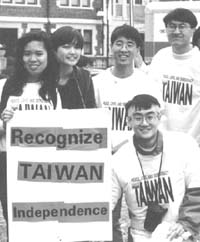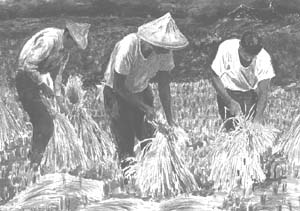 Taiwan
Communiqué No. 77, September 1997
Taiwan
Communiqué No. 77, September 1997 Taiwan
Communiqué No. 77, September 1997
Taiwan
Communiqué No. 77, September 1997
With the visit of China's President Jiang Zemin to Washington coming up, there will undoubtedly be another public debate about Taiwan and its status. Some commentators have argued that this matter should have a low profile, lest it "provokes" the Chinese, and aggravates the "sensitive" ties between the United States and China.

Give the Taiwanese a free choice
We argue that this matter is equally if not more sensitive to the people of Taiwan, whose voice was never heard in the debates about the future of the island. At Shimonoseki (1895), Cairo (1943), San Francisco (1952), and Shanghai (1972), other powers made pronouncements and decisions about the status of Taiwan without consulting the people of Taiwan. This time around, it is essential that the people of Taiwan have a free choice on their future.
The "One China" policy is now outdated. The notion that "Taiwan is part of China" is an anachronistic fiction and should therefore be discarded immediately. The native Taiwanese (85% of the population of the island) had nothing to do with the Civil War in China, but from the 1940s on became unwilling victims when the Kuomintang moved to the island and established its repressive regime. We don't want the future of our homeland to become a hostage to that Civil War.
The US and other democratic nations around the world owe it to the people of Taiwan and to their own conscience that the principles of freedom, democracy, and self-determination are upheld, and that Taiwan is accepted in the international community as a free, democratic and independent nation.
The historic boundaries of China do not include Taiwan: before the 1600s, Malay-Polynesian aborigines inhabited the island, and when the Dutch landed in Anping (present-day Tainan) they went there because the Chinese Imperial authorities considered this "outside the boundaries of Chinese territory." Earlier the Dutch had attempted to establish trading settlements near Macao.
The Dutch found no trace of administration by any mainland authority. Only after they developed plantations there, did Chinese laborers from the coastal provinces start to migrate to the island not "on behalf of the Chinese Empire", but to flee the harsh life in China. They intermingled with the aborigines, and a new identity was born, the Taiwanese.
Only in 1887, did the Chinese Emperor briefly attempt to incorporate Taiwan as a province of China, but this exercise was short-lived: at the 1895 Treaty of Shimonoseki, China formally ceded sovereignty over Taiwan to Japan, in perpetuity. Taiwan remained an integral part of Japan until 1945, and most older Taiwanese speak only Japanese and Hok-lo (Taiwanese), not the Chinese Mandarin dialect brought over by Chiang Kai-shek from China.
The large majority of the people in Taiwan consider themselves Taiwanese, not Chinese in the same way the people in the United States consider themselves Americans and not a subject of Great Britain anymore, in spite of the fact that they speak English.
The Taiwanese have made it clear over the past years that they want to be accepted in the international community as a free and democratic nation. They emphasize that they wish to live side by side with China as friendly neighbors, but will defend themselves if necessary to preserve their freedom and independence or in Western words: "life, liberty and the pursuit of happiness." Taiwan doesn't want to be on a collision course with China, but it is China which should stop its threats and aggression.
Perpetuating the "creative ambiguity" of the "One China" policy condones China's aggression and fans the flames of Chinese nationalism, endangering peace and stability in East Asia.
As was stated in a Washington Post editorial ("Is Taiwan next ?", 1 July 1997): "Whatever Taiwan's future whether peaceful reunification, federation, independence or some other option the people of Taiwan must be allowed to decide."

Rediscovering the Taiwanese identity
We may add: the people of Taiwan must be allowed to decide without interference by China. In fact, an opinion poll in Taiwan, conducted just after Hong Kong's absorption by Beijing, showed that the percentage of the Taiwanese population in favor of formal independence is rising fast. In a public opinion survey conducted by the United Daily News on 1-2 July 1997 among 949 respondents in Taiwan, a record 43 percent said they would opt for independence. In a poll conducted in January of this year, only 34 percent said they favored independence.
It was the first time since 1989, when opinion polls on this issue started in Taiwan, that the percentage favoring independence outstripped the pro-unification sentiment, which is still the formal policy of the Kuomintang authorities.
When given the additional choice of "maintaining the status quo", 43 percent said they wanted to see things stay unchanged. The report remarked, though, that many people on the island maintain that the status quo is de facto independence.
The poll also showed that when asked about their personal identity, more than half said they regarded themselves as Taiwanese, while only 30 percent identified themselves as Chinese a major set-back for the Nationalists of the Kuomintang, who have been emphasizing that the people on Taiwan are "Chinese."
In the debate about China policy in the U.S., the proponents of "engagement" argue that the US needs to "cooperate with China" (Henry Kissinger, Washington Post, July 6th, 1997) and that we shouldn't "demonize" China (former President Jimmy Carter: "It's wrong to demonize China", New York Times, August 10th, 1997).
While we appreciate Mr. Carter's attempt to contribute to the discussion on US relations with China, he starts out on the wrong foot: nobody is trying to "demonize" China: China has only itself to blame for its negative international image.
If China had not clamped down on its people at Tienanmen, if it had allowed the Tibetans to make a free choice on their future, if it had not threatened to invade Taiwan and hadn't fired missiles, then the international perception of China would have been more positive. It is thus incongruous of Mr. Carter to lay the blame on "ill-informed commentators." It is the Chinese government which needs to shape up or ship out.
With regard to Taiwan, Mr. Carter only mentions the Chinese resentment against US sales of F-16s and other weaponry. He might also have mentioned our resentment against being ostracized by the international community in spite of the fact that we have achieved a democratic system, and that we now are a free and independent nation.
We Taiwanese-Americans are in favor of improvement of relations with China, but this should not take place at the expense of the 21 million people of Taiwan or their future as a free, democratic and independent country. Taiwan's international position is unclear because of:
1. the shortsighted policies of Taiwan's Kuomintang authorities themselves, who for far too long claimed to be the legitimate rulers of China; and
2. the "creative ambiguity" of the "One China" policy as laid down in the three Sino-American Communiqués of 1972, 1978 and 1982, which were arrived at without any democratic representation of, or consultation with, the Taiwanese people. Our voice was never heard.
In September and October 1997, two presidents are visiting the United
States: in the beginning of September, Mr. Lee Teng-hui, Taiwan's
President, is stopping over in
Hawaii on his way to Panama.
At the end of October, Mr. Jiang Zemin, China's president, is being
invited to come to Washington. It is interesting to examine the
differences:
Mr. Jiang Zemin is the President of what is generally considered a repressive nation, with a lack of basic human rights, civil liberties and political freedom. China continues to deny the Tibetan people the right to decide their own future, it smuggles nuclear technology and missiles to Iran, and perpetuates its military threats against Taiwan.
Still Mr. Clinton intends to receive Mr. Jiang in Washington for a "high-level" meeting, and no doubt will fete him to a number of receptions and dinners.
In contrast, Mr. Lee Teng-hui is the President of a democratic nation, which made a remarkable transition from being a repressive nation only a decade ago. Thanks to its peace-loving people and democratic opposition, Taiwan is a showcase for freedom and democracy in Asia.
Still, the Clinton Administration imposed tight restrictions on Mr. Lee's visit: according to a State Department official "...he will not be allowed to hold news conferences, give any speeches or hold political rallies" ("Taiwan Again an issue in U.S. China relations", Washington Post, 27 July 1997).
It seems the U.S. is ignoring a democracy to expedite relations with a dictatorship. This message was also contained in a statement by a number of members of the U.S. House of Representatives, which was issued on 3 September 1997. In the statement, titled "Red carpet for a dictator and back door for a democrat", the members of Congress extended an invitation to Mr. Lee to come to the United States.
Back to: Table of Contents
Copyright © 1997 Taiwan Communiqué